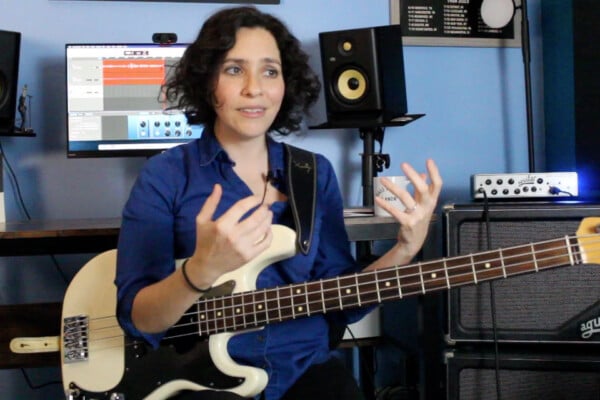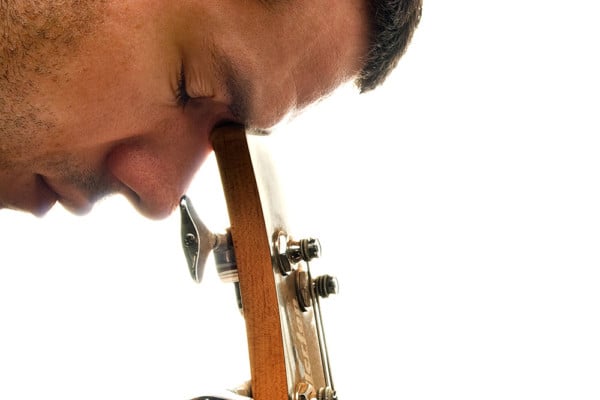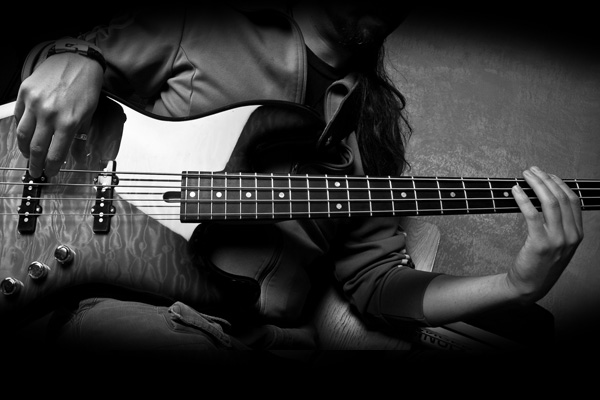Keeping Students Interested When Studying Bass
Q: I loved the column on giving guidance to students. Do you have suggestions for guiding teachers in bass teaching? I struggle keeping my beginning students interested when I have them “eat vegetables” – like scales and note reading and rhythm practice. How do you find the balance between serving vegetables and meat with potatoes and even dessert as a teacher? I’m sure you will get my silly analogy. Would love to hear your thoughts. You always have excellent insight.
A: I have had the same problem, and I don’t often work with beginning students unless they are hyper motivated to learn. As a student, I only made it through that phase of my development because I had a family member force me to practice (often with me kicking and screaming). He just told me that I’d thank him one day, and I did, although I despised every moment at the time.
The best results I’ve had with beginners is trying to show them the benefits of knowing scales and the rest by virtue of comparison to the music they like. I might have them bring in a favorite song, help them learn it by ear over the course of a lesson and then follow up in future lessons by showing them how the bass line really came out of some scalar or pentatonic patterns. This way, they tend to remember the patterns and sounds because they have a point of reference.
It’s all about showing them how they can make the music they want by learning scales and be more like “X” player by dissecting some licks, solos or tunes of the students choosing and showing how it all really came from this pool of knowledge and understanding.
In the end, you can’t make them do the work and many students will fall off once they realize that there’s hard work involved in actually becoming good.
I also don’t force every student to work on everything under the sun unless they want to become the type of player that needs to do that kind of work. (Keep in mind, that I tend to work with college students and adults). If somebody comes to me looking to just have a little better of an idea how to jam with friends on weekends, I won’t give them a bunch of notation and jazz theory homework. But if somebody wants to be a professional, freelance musician you can bet that I’ll give them five lifetimes worth of work.
I teach jazz camps on occasion and this is something I’ve been struggling with. I’ve had a hard time dialing it back for the beginners. Granted, it’s also a jazz camp, so I can’t just show them how to play Flea slap bass lines and call it a day. It can be hard to strike a balance.
With the general, beginning, younger student, I think the best thing that we can do is:
- Get them excited to learn and make them want to learn more.
- Get them learning tunes by ear.
- Let them start on stuff they love to get going and maybe, eventually, gently guide them toward tunes that force them to work on new things.
- Slowly direct them towards different tonalities and genres.
- Get them wondering what that “new” sound is and then you may find them excited to learn a certain scale, for example.
You can’t force them to walk through that door unless they have some dedicated parents who will force them to do the work. Instead, try and find creative ways to make them want to go through that door. Keep them having fun and excited and they won’y even know that they’re actually “working” on something.
I‘m sure that many of you have students of your own. How do you keep the early developers both happy and engaged? Please share in the comments.
Have a question for Damian Erskine? Send it to [email protected]. Check out Damian’s instructional books, Right Hand Drive and The Improviser’s Path.




I have to agree with Damian,the first thing I have found with new students is the fact that their finger tips are quite soft, so this can be off putting to begin with. I also take their bass and set it up for the best possible action, so that it takes the least amount of effort to play on.I have found that after I have done the above they feel much more comfortable and are more willing to practice.I also endevour to show them what I consider to be the least stressful right and left hand positions so that this also becomes much easier. I also like Damian, try to demonstrate what is achievable with practice and effort, I find that you have to find the fine line between encouraging your student and having them feel that the whole thing is impossibly difficult. I start them off on chord tone practice rather than scales and them gradually introduce chromatic scale notes to move from chord to chord, this way they will slowly learn the scales that are involved with out actually spending hours on scales alone. I have found that for the most part the enthusiasm slowly builds as they start to realize that they are starting to make music
After a few years you can get to recognize a student who really wants to learn.as opposed to the ones who thing that they will conquer the instrument simply by holding it in their hands and looking cool. I have spent time in High schools teaching students and have had more successes than failures..
I usually try to learn play some music they like and know. A cool logical riff. (7 nation army) Then there’s a chance they practice longer and more often. If not on the homework at least they play. If you reach there passion the pupil works by it self. Maybe even more important for basstudents. It can be a bore playing scales or basslines. And I also introduce the chord first and the chords of a tonality. Later I show them scales. I try to learn them how to get trough a easy chord progression so they can get “professional” as fast as possible. I try to get the student on the scene as fast as possible. At least that is what I’m working for. When I was young there where a fast progression from buying a bass to making money playing on dances. Sorry for bad english
I agree with William – it is very important to have the action set up properly and make sure beginning students build up their calluses gradually. Also, what helped me early on in my bass-playing career was seeing really amazing professional bass players play live. I started out on a four-string after seeing Johnny Castle play with Bill Kirchen. I was very fortunate to study with Johnny personally. Then I got into five- and six-string bass after seeing Jojo Garza of Los Lonely Boys live. Once I got the hang of it, I loved it. Even if you live in a small town, community colleges often have ensembles with really good bass players. It’s always inspiring to see great bass players live!